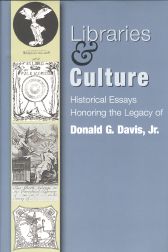Robert Sidney Martin
Why do we study the history of libraries and other cultural agencies? There are many facile responses to this rhetorical question and a few substantive ones. The facile ones follow the ancient discussion about the utility and value of history generally. The most ready response for most people might be to cite Santayana’s dictum that those who cannot remember the past are condemned to repeat it. In opposition to this, however, is the equally famous pronouncement of George Bernard Shaw that all we learn from history is that man can never learn anything from history. Even more cynical is the claim, attributed to the distinguished Oxford historian, A. J. P. Taylor, that the sole purpose for the study of history is to amuse the historian.
We must know otherwise. It is often stated that libraries, archives, museums, and other cultural heritage agencies together constitute the memory of humanity. It is only natural, therefore, that librarians would take an active interest in the past of their institutions and their profession. That interest is fueled not by serendipity but by a conscious and constructive need to understand today in the context of what has gone before.
We can only understand the issues of our day by examining them in the context of their historical development. Perhaps the best example of this is the complex interaction between technology and society. Understanding how the technology for recording and transmitting information and knowledge evolved provides a robust framework for comprehending the maelstrom of current technological evolution. We must not forget that "technology" does not mean something that is powered by electricity and connected to a network. Stylus and clay tablet, brush and papyrus scroll, quill and velum codex, moveable type and printing press all were technological innovations in their respective eras, and the advent of each had a revolutionary impact on society. Digital information technology stands not apart but as a chapter in this emerging narrative.
It is therefore imperative that the curriculum of today's programs of instruction that prepare professionals for a practice in libraries, archives, museums, and other cultural heritage agencies are informed throughout with a significant infusion of history both as content and as method. Focusing instruction solely on current practices and principles is sterile and devoid of context. It is important not only to offer specific courses devoted to historical subjects. It is even more important that a foundation in the historical background of any subject be woven appropriately into coursework on all topics.
The individual to whom the essays in this volume are dedicated is an outstanding example of the importance of studying and practicing history. Donald G. Davis, Jr., has not only contributed substantially to the literature of the field, but he has also informed the professional preparation of thousands of librarians, archivists, and other information professionals with a profound understanding of how today's practice is rooted in its historical context. He has also produced numerous protégés who have themselves contributed substantially to the literature of the field and to the preparation of other professionals. Many of the distinguished authors of the essays that follow are former students of Professor Davis. The impact of his mentorship on their thinking, worldview, and accomplishments has been demonstrably powerful.
Equally important, Professor Davis has influenced countless other practitioners and colleagues with whom he has come in contact. Many historians of libraries and related professionals-including the present writer-have benefited from his wise counsel and enthusiastic encouragement of their work. His impact on the profession has been profound.
As we must all recognize the importance of history in our daily practice as well as in our intellectual pursuits, so too must we recognize our indebtedness to this singular historian, colleague, and gentleman.

